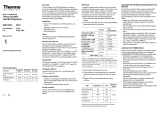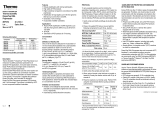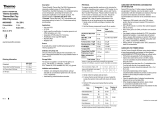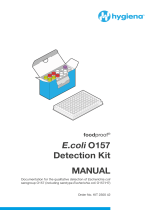Page is loading ...

PRODUCT INFORMATION
2X PCR Master Mix (1.5 mM MgCl
2
)
#AB-0575/DC/A
2 x 1 mL
Lot __ Expiry Date __
Store at -20°C
d
Ordering Information
Component
#
AB
-
0575/DC/A
160 rxns of 25 µL
#
AB
-
0575/DC/B
1600 rxns of 25 µL
2X PCR Master Mix
with 1.5 mM MgCl2 2 × 1 mL 20 × 1 mL
www.thermoscientific.com/onebio
Rev.3
1
Description
The PCR Master Mix is a ready-to-use master mix. It is a
convenient way of amplifying DNA fragments without the
need to thaw individual components, reducing the risk of
contamination and pipetting errors. Thermo Scientific
ThermoPrime Taq DNA Polymerase, dNTPs, reaction
buffer and magnesium chloride are all present in the mix.
ThermoPrime™ has 5' to 3' polymerization and
exonuclease activity but lacks 3' to 5' exonuclease
activity (proofreading).
Composition
The final 1X reaction contains 0.625 u ThermoPrime Taq
DNA Polymerase, 75 mM Tris-HCl (pH 8.8 at 25°C),
20 mM (NH
4
)
2
SO
4
, 1.5 mM MgCl
2
, 0.01% (v/v)
Tween
®
20, 0.2 mM each of dATP, dCTP, dGTP and
dTTP.
Applications
• High throughput PCR.
• Routine PCR with high reproducibility.
• Generation of PCR products for TA cloning.
• RT-PCR.
Storage conditions
Store at -20°C until ready for use. Avoid freeze thawing.
The vial can be stored at +4°C for up to 1 month.
PROTOCOL
1. Gently vortex and briefly centrifuge PCR Master Mix
after thawing.
2. Place a thin-walled PCR tube on ice and add the
following components for each 25 µL reaction:
Volume
Final
concentration
2X PCR Master Mix
12.5
µL
1X
Forward primer, 10 µM
1.25
µL
*
0.5 µM*
Reverse primer, 10 µM
1.25
µL
*
0.5 µM*
Template DNA
0.5
–
10
µL
0.5
–
125 ng
Water, nuclease
-
free
to 25
µL
Total volume
25
µL
*
Scale up or down the volume and concentration as appropriate.
3. Gently vortex the samples and spin down.
4. Perform PCR using the recommended thermal
cycling conditions outlined below:
Step
Temperature,
°C Time
Number of
cycles
Initial denaturation 95 2 min 1
Denaturation
95
2
0 s
30-40 Annealing 50-65 30 s
Extension
**
72
60 s
Final Extension
72
5
min
1
**
Increase length of time in proportion to size of amplicon. ThermoPrime
Taq DNA Polymerase extends at approximately 1000 bp/min.
GUIDELINES FOR PREVENTING CONTAMINATION
OF PCR REACTION
During PCR more than 10 million copies of template DNA
are generated. Therefore, care must be taken to avoid
contamination with other templates and amplicons that
may be present in the laboratory environment. General
recommendations to lower the risk of contamination are
as follows:
• Prepare your DNA sample, set up the PCR mixture,
perform thermal cycling and analyze PCR products
in separate areas.
• Set up PCR mixtures in a laminar flow cabinet
equipped with an UV lamp.
• Wear fresh gloves for DNA purification and reaction set
up.
• Use reagent containers dedicated for PCR. Use
positive displacement pipettes, or pipette tips with
aerosol filters to prepare DNA samples and perform
PCR set up.
• Always perform “no template control” (NTC)
reactions to check for contamination.
GUIDELINES FOR PRIMER DESIGN
Use the Thermo Scientific REviewer primer design
software at www.thermoscientific.com/reviewer or follow
the general recommendations for PCR primer design as
outlined below:
• PCR primers are generally 15-30 nucleotides long.
• Differences in melting temperatures (Tm) between
the two primers should not exceed 5°C.
• Optimal GC content of the primer is 40-60%. Ideally,
C and G nucleotides should be distributed uniformly
along the primer.
• Avoid placing more than three G or C nucleotides at
the 3’-end to lower the risk of non-specific priming.
• If possible, the primer should terminate with a G or C
at the 3’-end.
• Avoid self-complementary primer regions,
complementarities between the primers and direct
primer repeats to prevent hairpin formation and
primer dimerization.
• Check for possible sites of undesired complementary
between primers and template DNA.
• When designing degenerate primers, place at least
3 conservated nucleotides at the 3’-end.
Estimation of primer melting temperature
For primers containing less than 25 nucleotides, the
approx. melting temperature (Tm) can be calculated
using the following equation:
Tm= 4 (G + C) + 2 (A + T),
where G, C, A, T represent the number of respective nucleotides
in the primer.
If the primer contains more than 25 nucleotides we
recommend using specialized computer programs e.g.,
REviewer™ (www.thermoscientific.com/reviewer) to
account for interactions of adjacent bases, effect of salt
concentration, etc.
COMPONENTS OF THE REACTION MIXTURE
Template DNA
Optimal amount of template DNA for a 25 µL reaction
volume is 0.5 – 125 ng. Higher amounts of template
increase the risk of generation of non-specific PCR
products. Lower amounts of template reduce the
accuracy of the amplification.
All routine DNA purification methods can be used to
prepare the template e.g., Thermo Scientific GeneJET
Genomic DNA Purification Kit (#K0721) or GeneJET™
Plasmid Miniprep Kit (#K0502). Trace amounts of certain
agents used for DNA purification, such as phenol, EDTA
and proteinase K, may inhibit DNA polymerase. Ethanol
precipitation and repeated washes of the DNA pellet with
70% ethanol usually removes trace contaminants from DNA
samples.
Primers
The recommended concentration range of the PCR
primers is 0.1-1 µM. Excessive primer concentrations
increase the probability of mispriming and generation of
non-specific PCR products.
For degenerate primers and primers used for long PCR
we recommend higher primer concentrations in the range
of 0.3-1 µM.
(continued on reverse page)

CYCLING PARAMETERS
Initial DNA denaturation and enzyme activation
It is essential to completely denature the template DNA at
the beginning of PCR to ensure efficient utilization of the
template during the first amplification cycle. If the GC
content of the template is 50% or less, an initial 1-3 min
denaturation at 95°C is sufficient.
Denaturation
A DNA denaturation time of 20 seconds per cycle at
95°C is normally sufficient. For GC-rich DNA templates,
this step can be prolonged to 3-4 min.
Primer annealing
The annealing temperature should be 5°C lower than the
melting temperature (Tm) of the primers. Annealing for
30 seconds is normally sufficient. If non-specific PCR
products appear, the annealing temperature should be
optimized stepwise in 1-2°C increments.
Extension
The optimal extension temperature for Thermoprime
Taq DNA polymerase is 70-75°C. The recommended
extension step is 1 min/kb at 72°C.
Number of cycles
If less than 10 copies of the template are present in the
reaction, about 40 cycles are required. For higher
template amounts, 30-35 cycles are sufficient.
Final extension
After the last cycle, it is recommended to incubate the
PCR mixture at 72°C for an additional 5-15 min to fill-in
any possible incomplete reaction products. If the PCR
product will be cloned into a TA vector, e.g., using
Thermo Scientific InsTAclone PCR Cloning Kit (#K1213),
the final extension step may be prolonged to 30 min to
ensure the highest efficiency of 3’-dA tailing of the PCR
product. If the PCR product will be used for cloning using
Thermo Scientific CloneJET PCR Cloning Kit (#K1231),
the final extension step can be omitted.
CERTIFICATE OF ANALYSIS
Functional Assay
2X PCR Master Mix with 1.5 mM MgCl
2
was tested for
amplification of 653 bp DNA fragment from 12.5 ÷ 100 ng
human genomic DNA.
Quality authorized by: Jurgita Zilinskiene
NOTICE TO PURCHASER:
Use of this product is covered by US Patent No. 6,127,155. The purchase
of this product includes a limited, non-transferable immunity from suit
under the foregoing patent claims for using only this amount of product for
the purchaser’s own internal research. No right under any other patent
claim, no right to perform any patented method and no right to perform
commercial services of any kind, including without limitation reporting the
results of purchaser's activities for a fee or other commercial
consideration, is conveyed expressly, by implication, or by estoppel. This
product is for research use only. Diagnostic uses under Roche patents
require a separate license from Roche. Further information on purchasing
licenses may be obtained by contacting the Director of Licensing, Applied
Biosystems, 850 Lincoln Centre Drive, Foster City, California 94404, USA.
PRODUCT USE LIMITATION
This product is developed, designed and sold exclusively for research
purposes and in vitro use only. The product was not tested for use in
diagnostics or for drug development, nor is it suitable for administration to
humans or animals. Please refer to www.thermoscientific.com/onebio for
Material Safety Data Sheet of the product.
© 2012 Thermo Fisher Scientific, Inc. All rights reserved. Tween is a
registered trademark of ICI America, Inc. All other trademarks are the
property of Thermo Fisher Scientific Inc. and its subsidiaries.
/










